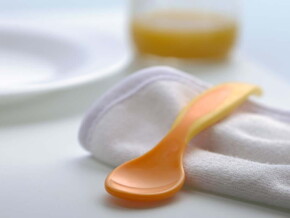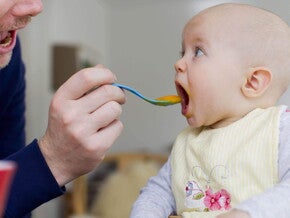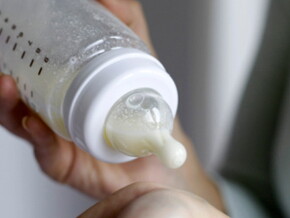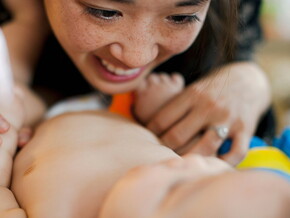
- True or False? The number of months that a mom breastfeeds is important for decreasing allergy risk.
True! Now that your baby is six months of age, they need more than exclusive breastfeeding in their diet. Along with starting complementary foods, keep on breastfeeding to provide your baby with benefits to their immune system and health. And, the longer you breastfeed, the less likely your baby is to have allergies. - True or False? Eggs should not be introduced until your baby is one year old.
False! You can give your healthy baby cooked eggs in age-appropriate texture, along with other complementary foods, from six months of age. - True or False? You can offer your baby fish before they’re 12 months old.
True! Fish can be introduced along with other complementary foods. Fish provides DHA, an omega-3 fatty acid, which is important for your baby's brain and eye development. Avoid fish known to contain high amounts of mercury, such as king mackerel, canned/frozen tuna, and swordfish. - True or False? Foods containing peanuts can be given to babies at six months.
True! For healthy babies, without previously diagnosed allergies, foods containing peanuts can be introduced at around six months of age, along with other complementary foods. The texture needs to be age-appropriate and given in very tiny amounts. The peanuts should be ground and not given whole. If your baby has eczema or another food allergy, their first taste of peanuts should be supervised by a healthcare professional. Check with your healthcare provider for advice for you and your baby before introducing peanuts. - True or False? Giving your baby foods that commonly cause allergies, such as those with eggs, fish, wheat, or peanuts, when you begin complementary feeding can reduce the chance of him developing a food allergy.
True! If your baby has eczema, a family history of allergy, or any current food allergy, speak with your healthcare provider before introducing potential allergy-triggering foods. For healthy babies, research indicates that, once your baby is eating solids, including small amounts of these foods in his diet, one at a time, may decrease the risk of an allergy. It is thought that eating these foods early may help your baby develop a tolerance and therefore decrease the chances of allergy. - True or False? If you’re breastfeeding you should exclude foods known to cause allergies from your diet.
False! There is no need to restrict your diet while you’re breastfeeding. Experts agree that there is no need for breastfeeding moms to follow an allergen-free diet, unless they have an allergy themself. - True or False? Foods containing gluten, which is found in wheat, barley, and rye, can be given to your baby when you start complementary feeding (around six months of age).
True! Current recommendations are to introduce gluten at around six months of age, when other complementary foods are offered to your baby. As with introducing any new food, offer your baby gluten-containing foods in small amounts for their first few tastes. If after a few days your baby has no signs or symptoms of an allergic reaction, you can then offer them another new food.
Sources
Abrams EM, Hildebrand K, Blair B, et al. Canadian Paediatric Society Practice Point. Timing of introduction of allergenic solids for infants at high risk. Paediatr Child Health. 2019;24(1):56-57.
Du Toit G, Sayre PH, Roberts G et al. Effect of avoidance on peanut allergy after early peanut consumption. N Engl J Med 2016; 374(15):1435-43.
Du Toit G, Roberts G, Sayre PH et al. Randomized trial of peanut consumption in infants at risk for peanut allergy. N Engl J Med 2015; 372(9):803-13.
Fewtrell M, Bronsky J, Campoy C et al. Complementary feeding: A position paper by the European society for paediatric gastroenterology, hepatology and nutrition (ESPGHAN) committee on nutrition. J Pediatr Gastroenterol Nutr 2017; 64(1):119-32.
Greer FR, Sicherer SH, Burks AW et al. Effects of early nutritional interventions on the development of atopic disease in infants and children: the role of maternal dietary restriction, breastfeeding, timing of introduction of complementary foods, and hydrolyzed formulas. Pediatrics 2008; 121(1):183-91.
Ierodiakonou D, Garcia-Larsen V, Logan A et al. Timing of allergenic food introduction to the infant diet and risk of allergic or autoimmune disease. A systematic review and meta-analysis. JAMA. 2016; 316(11):1181-92. doi:10.1001/jama.2016.12623.
Togias A, Cooper SF, Acebal ML et al. Addendum guidelines for the prevention of peanut allergy in the United States: Report of the national institute of allergy and infectious diseases-sponsored expert panel. J Allergy Clin Immunol 2017; 139(1):29-44.
www.worldallergy.org (Accessed December 18, 2017)
Last revised: December, 2017





















